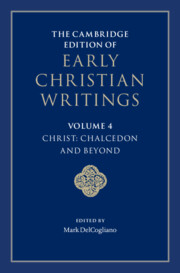Book contents
- The Cambridge Edition of Early Christian Writings
- The Cambridge Edition of Early Christian Writings
- The Cambridge Edition of Early Christian Writings
- Copyright page
- Contents
- Notes on Contributors
- Acknowledgments
- Note on the Texts and Translations
- Abbreviations
- Series Introduction
- Introduction
- Part I The Council of Chalcedon and Its Reception
- Part II Christological Perspectives after Constantinople II
- 20 Emperor Justin II, The Second Henotikon
- 21 Gregory the Great, Selections from his Homilies
- 22 Gregory the Great, Letters 1.24, 10.21, and 11.52
- 23 Anonymous Apology for Narsai
- 24 Babai the Great, On the Union 9 and 17
- 25 Sophronius of Jerusalem, Synodical Letter 1.6 and 3.1–17
- 26 Ekthesis of Emperor Heraclius
- 27 Maximus the Confessor, Ambiguum 31 to John
- 28 Maximus the Confessor, Ambiguum 5 to Thomas
- 29 Maximus the Confessor, Opusculum 3
- 30 Maximus the Confessor, Opusculum 6
- 31 Maximus the Confessor, Opusculum 7
- 32 Typos of 647/8
- 33 Acts of the Lateran Synod (October 649): Selected Proceedings and the Synodal Definition
- 34 Acts of the Third Council of Constantinople (680–681): Selected Proceedings and the Synodal Definition
- 35 John of Damascus, On Composite Nature against the Leaderless
- 36 John of Damascus, On the Faith against the Nestorians
- 37 John of Damascus, An Exact Exposition of the Orthodox Faith 57–58
- Suggestions for Further Reading
- Scriptural Index
29 - Maximus the Confessor, Opusculum 3
from Part II - Christological Perspectives after Constantinople II
Published online by Cambridge University Press: 11 February 2022
- The Cambridge Edition of Early Christian Writings
- The Cambridge Edition of Early Christian Writings
- The Cambridge Edition of Early Christian Writings
- Copyright page
- Contents
- Notes on Contributors
- Acknowledgments
- Note on the Texts and Translations
- Abbreviations
- Series Introduction
- Introduction
- Part I The Council of Chalcedon and Its Reception
- Part II Christological Perspectives after Constantinople II
- 20 Emperor Justin II, The Second Henotikon
- 21 Gregory the Great, Selections from his Homilies
- 22 Gregory the Great, Letters 1.24, 10.21, and 11.52
- 23 Anonymous Apology for Narsai
- 24 Babai the Great, On the Union 9 and 17
- 25 Sophronius of Jerusalem, Synodical Letter 1.6 and 3.1–17
- 26 Ekthesis of Emperor Heraclius
- 27 Maximus the Confessor, Ambiguum 31 to John
- 28 Maximus the Confessor, Ambiguum 5 to Thomas
- 29 Maximus the Confessor, Opusculum 3
- 30 Maximus the Confessor, Opusculum 6
- 31 Maximus the Confessor, Opusculum 7
- 32 Typos of 647/8
- 33 Acts of the Lateran Synod (October 649): Selected Proceedings and the Synodal Definition
- 34 Acts of the Third Council of Constantinople (680–681): Selected Proceedings and the Synodal Definition
- 35 John of Damascus, On Composite Nature against the Leaderless
- 36 John of Damascus, On the Faith against the Nestorians
- 37 John of Damascus, An Exact Exposition of the Orthodox Faith 57–58
- Suggestions for Further Reading
- Scriptural Index
Summary
Opusculum 3 is another work that stems from Maximus’s involvement in the monoenergist and monothelite controversies. It is a fragment of a lost treatise that Maximus wrote On the Activities and the Wills, to Thalassius. Thalassius is most likely the theologian known as “Thalassius the Libyan,” who composed works of ascetic theology, including the Centuries on Theology, now included in the Philokalia. He was a leader of monks in Carthage during the reign of Heraclius (610–641). Maximus wrote several of his most important works in response to Thalassius, including his massive Questions on Sacred Scripture (ca. 633), in which he expounds on sixty-five difficult passages in scripture that Thalassius had identified. Maximus wrote On Activities and Wills in the early 640s, once he had fully entered the monothelite controversy. Only a few fragments of this treatise survive: chapter 50 (as Opusculum 2), chapter 51 (the present Opusculum 3), and some quotations in the florilegium known as Opusculum 26b.
- Type
- Chapter
- Information
- The Cambridge Edition of Early Christian Writings , pp. 492 - 499Publisher: Cambridge University PressPrint publication year: 2022

